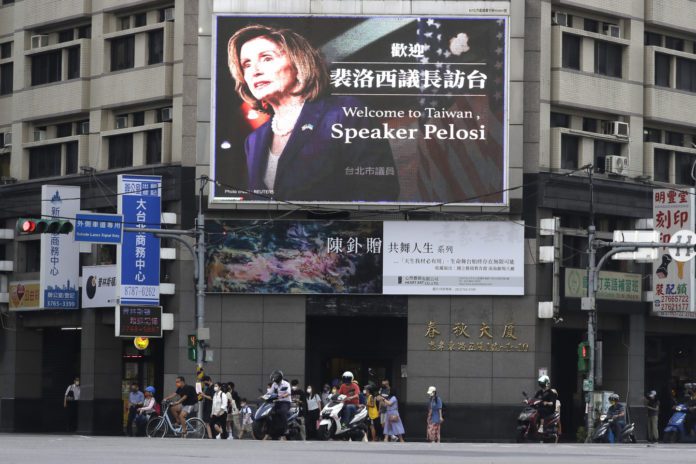This article was originally published in RealClear Policy.
The visit of Nancy Pelosi, the speaker of the US House of Representatives, has changed the strategic calculus in the Taiwan Straits. The Chinese government has reacted in public with rage, and its past behavior indicates that its future behavior may well be very dangerous. Will the communist party leadership be angry enough to invade the island? We argue that the chances of that outcome are sufficiently high that the US government should reconsider its long-standing policy of strategic ambiguity, in favor of much more concrete statements in conjunction with its allies in the region, to defend the democratic state if it is attacked.
Analysts often speak of such things in all-or-nothing terms: policy X will guarantee outcome Y. But of course our world, including our geopolitical world, is defined by uncertainty. Speaker Pelosi’s trip has brought Taiwan’s democratic nature, and the threat it faces from the totalitarian government across the straits, greater attention in the U.S. and indeed the world. Here we consider whether it should cause the US government and other democracies, assuming they both wish to deter an attack and are willing to wage war on another rampaging dictatorial power to defend the global liberal order, and for the US in particular to change its long-standing policy of strategic ambiguity — refusing to say whether it would militarily defend Taiwan.
We believe simple but rigorous thinking helps answer this question. Let us denote China’s military force by C, and Taiwan’s by T, and assume these are fixed. Let A be the military force capable of being brought to bear by the US and any allies that join it, also constant. (Once the war is on, it is on in full.) As the Chinese calculate whether it is worth it to wage war, we assume that they are concerned only with the probability they will win. Assume that China assumes that if the allies commit no resources, he believes with certainty that China will win. (Recent events in Ukraine have taught us the actual probability is surely less than one, but the military imbalance between China and Taiwan is probably much greater than between Russia and Ukraine.)
This probability currently depends on T, A, and the probability that the allies will respond militarily. Let p be this probability. Economic analysis of conflict situations has long worked from the premise that in any conflict, war or otherwise, the probability of one side winning depends on its relative commitment of resources to the conflict. Of course if China attacked, it would go nearly full-force. The amount of force the allies commit might simply be an estimate on his part.
Now, with strategic ambiguity, the Chinese attack if Kp(A + T, C) > (1-K)p(T, C), where p is the probability of victory function given two possibilities of allied effort (in or out) and K is China’s assessed probability that the allies will go to war on Taiwan’s behalf. If the allies pledge to defend Taiwan (and ignoring the very small probability that they would not adhere to such a pledge if war broke out), China now thinks only of p(A +T, C). In this simple framework, credible commitment means Xi Jinping is deterred.
A 2021 report from the Rand Institute indicates that Chinese military power increased relatively faster than U.S. power between 1996 and 2017. Events since 2017 indicate the gap has almost certainly shrunk further since then. There are thus three key tasks now to deter an attack. First, through a combination of public statements and private representations strategic ambiguity must decline substantially if not end outright, i.e, K should be made to increase substantially. Thus, the allies must credibly pledge to help defend Taiwan with their own forces if it is attacked. (This in turn requires agreement in advance among U.S. Pacific allies, particularly Japan. Given that even Japan doing nothing more than allowing the U.S. to use its bases in that country would draw a Chinese response, the marginal cost of participating given the US attacks may be very low.) Second, the probability of victory p can be further lowered by fortifying Taiwan’s defenses even more, i.e. increasing the variable T. Third, the ability of China in the future to increase the resources it can bring to bear, i.e. C, should be limited to the extent possible by further constraining its ability to accumulate military capacity.
And so this approach indicates that while strategic ambiguity did its service when “China’s perceived relative capacity” (CPRC) to Taiwan and the U.S. combined, CPRC=C/(T+KA), was small. It helped prevent Taiwan from recklessly declaring independence, thus provoking a Chinese attack, perhaps with considerable international acquiescence. While Xi resembles Vladimir Putin in his complete indifference to the consequences of Chinese aggression for anything besides fortifying the hold on power of the Communist Party and of him in particular, he is not a madman. He will take account of expected costs and benefits. But only if they are made clear to him. To deter Xi over Taiwan, increasing K is a key, that is, shifting from “strategic ambiguity” toward “strategic clarity.”


